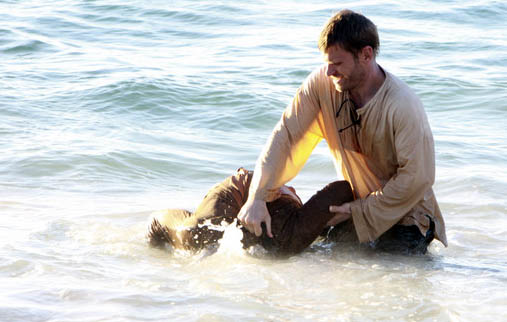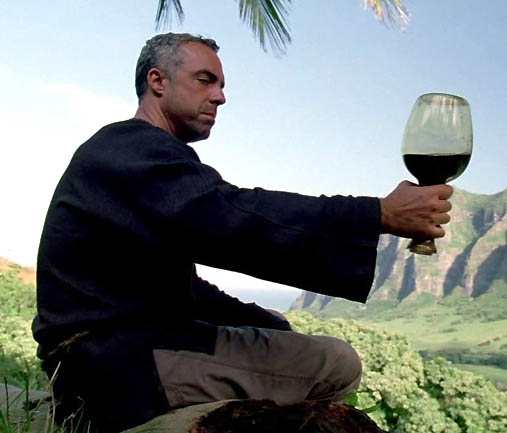Vorlons and cylons and Jacob: Lost Season 6
Lost Season 6: Ab Aeterno
I always prefer questions to answers (while demanding the answers that will ruin my fun). Lost hasn’t been nearly as much fun since it switched from world-building mode to a self-conscious endgame, too often combining glaringly on-the-nose dialogue with half-hearted jungle-walking scenes to pad out time between those revelations. The multi-layered storytelling (providing us with either an alternative reality to be crushed or an extended happier-ending epilogue to the entire series) is a fascinating device – I keep forgetting how amazing it is to have a major network show with an unexplained non-linear structure! – but the stories it tells are (possibly by necessity) more like bullet-point references to well worn tropes.
Depending on where the season heads, Ab Aeterno was either a refreshing break from that trend or the worst example of this tell-don’t-show headache. Concerning the ethical seduction of Richard Alpert, the episode is (possibly) filtered through the point of view of an uneducated 19th-century Catholic who’s recently lost his beloved wife and been condemned to death for the murder of the doctor who refused to save her – so Heaven, Hell, and the (im)possibility of redemption weight heavily on his mind. Both men offer him a version of salvation: Smokey releasing the starving man from his chains and bringing a vision of his lost wife, Jacob providing the immortal Purgatory that will give him time to redeem himself, or at least delay entering the fires of wife-less Hell.
It’s quite simple here: the Man in Black is sexy, persuasive Evil and the Man in White is remote, dissociated Good. Jacob keeps Smokey locked on the island – the metaphorical cork in the bottle – to protect the world.
Even this simple paradigm is a bit complicated: Jacob is a strange Good, bringing an endless stream of unsuspecting mortals to the island to be slaughtered in a vague effort to make Smokey see good in them (just before he rips them limb from limb, dying in agony and bewildered terror?). Their deaths are their own fault, he reasons, because they had to choose the mysterious right path on their own, without any intervention from him. This seems like the logic of a very old god, angered when individuals don’t chose against their own survival without compelling, or any, reason to do so.
Smokey, on the other hand, is much more basic. After releasing Richardo, he feeds him roasted boar, likely from the same menacing beast that feasted on the dead slaves chained next to him. There’s a clear message about life’s brutality there, an understanding and warning of what humans and gods will or must do when trapped. There may be a greater purpose to uphold or face punishment, but without the Cliff Notes, people have to make decisions based on the little information they’ve got.
Whether I’ll love or loathe this episode will depend on whether the Candidates ultimately take the Babylon 5 route and reject choosing between the powerful beings in favor of writing their own meanings on the blank canvas of the universe, or if it ends like the poor Battlestar Gallactica victims, frantically playing a rigged game in hopes they’d be rewarded with their bare lives. If it is (sigh) the latter, I’m joining Team Smokey, even if it does destroy the world (…more than we already have), solely because he’s got a much better grasp of free will, seeking to break the game rather than simply play it.

